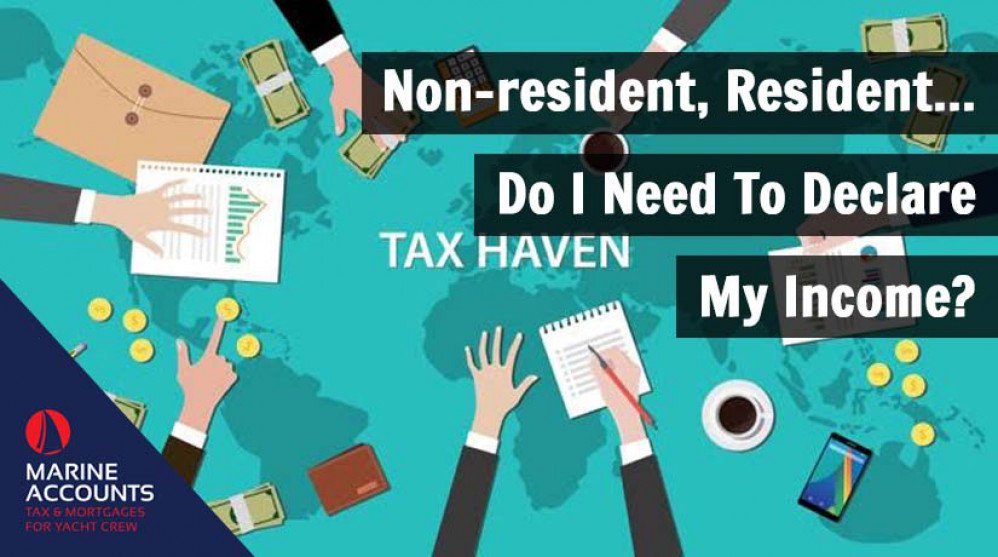Non-resident, Resident...Do I Need To Declare My Income?
- Authors
-
-

- Name
- Patrick Maflin
-

Image source: https://www.shutterstock.com/image-vector/tax-haven-panama-papers-concept-money-403395004
Since the introduction of the Common Reporting Standard (CRS) and the United States Foreign Account Tax Compliance Act (FATCA) in 2014, a common theme has developed in the yachting industry - a theme of confusion.
If you are working in the yachting industry and are still unsure where or when you should be declaring your income, you are not alone.
In fact the polar opposite is the case.
Our advice to you would be to prepare for the worst-case scenario, an investigation by any tax authority.

How do I prepare myself?
Naturally, your next question will be how do I do this?
The answer is to voluntarily disclose your income.
By doing so you will bring your tax affairs up to date in the eyes of your tax authority and be able to demonstrate clearly that you have made every effort to comply with the tax laws in your region.
If you can’t demonstrate this, you really have no stance for negotiation in the case of an investigation and leave yourself wide open to potential penalties.
In the post 2014 climate, in which tax authorities are able to pull your information from numerous sources, and 97 countries are exchanging information about your income and taxation, there really is no path that will give you the same peace of mind.
Why wouldn’t you disclose your income voluntarily?

Image source: https://images.unsplash.com/photo-1446822593536-ba168d292b37
Non-resident for tax purposes?
Another theme that we come across on a weekly basis whilst assisting yacht crew in bringing their seafarers tax affairs up to date is the misconception that because you believe yourself to be non-resident for tax purposes, tax authorities will not be interested in your movements.
Whilst it is correct to say that a non-resident is not obligated to disclose income anywhere in the world, the onus is strongly on you as an individual to build a case and demonstrate your non-residency.
If you aren’t able to present a convincing case for non-residency, it is highly likely that your tax authority will deem you to be a resident.
At this point, if you have not disclosed voluntarily, they wont offer you favorable terms.
With the disclosure process being as simple as it has become, is it worth that risk?
Further to this, residency has its advantages.
The UK in particular, is a strong example of the advantages of being a tax resident as a seafarer.
The Seafarers Earnings Deduction (SED) allows UK Yacht crew who spend less than 183 days a year in the UK to disclose their income from work on vessels with a £0 tax liability.
Tax residency and a paper trail to demonstrate your historic income could also open up a world of opportunity in terms of the financial instruments that are available to you.
You could find loans, mortgages and other tools are much more freely available to you, which is unlikely to be the case if you fail to disclose your income.
All you need to do is follow a number of simple tax checklist items to get your affairs in order, ready to self-assessment tax filing.
The UK is by no means alone.
The US offers a similar system, known as the Foreign Earned Income Exclusion, which allows up to $104,100 during the 2018 tax year, to be earned whilst employed in yachting to be disclosed tax free dependent on your circumstances.
What do I do now?
To summarise, we would encourage you to take a proactive rather than reactive approach to your tax affairs.
If you wait to be questioned by your tax authority before disclosing your income, you are likely to be faced with penalties ranging from monetary fines, to frozen assets if everything is not found to be 100% correct.
Transparency of your tax affairs will allow you to stay right where you want to be, in the peripheral vision of the tax authorities and not in their focus.
From our experience dealing with clients from the yachting industry, yachting careers can often be fleeting, and this is how you plan for a future after yachting.
Voluntarily disclosing your income is the best method currently available to you to come out of the industry with your affairs up to date, and with a clean slate moving forward.
Speak to Us or Comment!
If you have concerns about voluntarily declaring your income to the tax authorities, we can help review your situation and offer advice on your tax obligations. Alternatively, let us know what you think in the comments section below, or get in touch with us.
Please feel free to email us directly using the link below:
Click for Tax Return Advice for Seafarers & Yacht Crew
Liked this article? Try reading: Yacht Crew Tax & Financial Information - Your Ultimate Guide
Any advice in this publication is not intended or written by Marine Accounts to be used by a client or entity for the purpose of (i) avoiding penalties that may be imposed on any taxpayer or (ii) promoting, marketing or recommending to another party matters herein.


